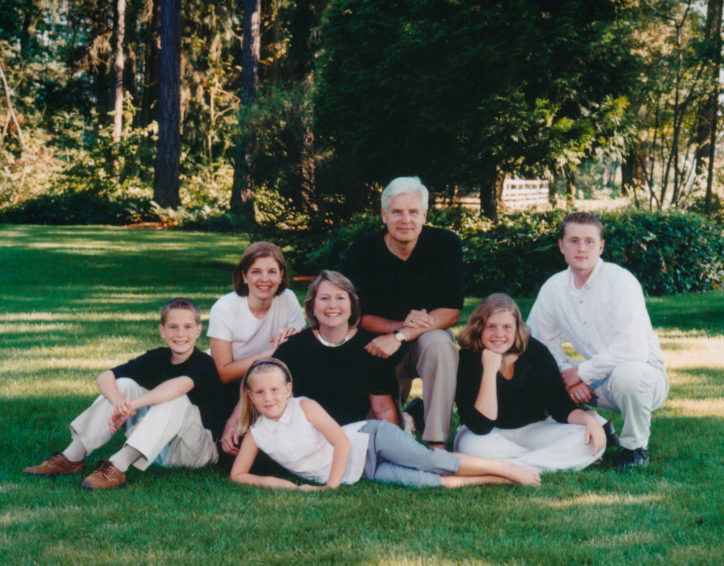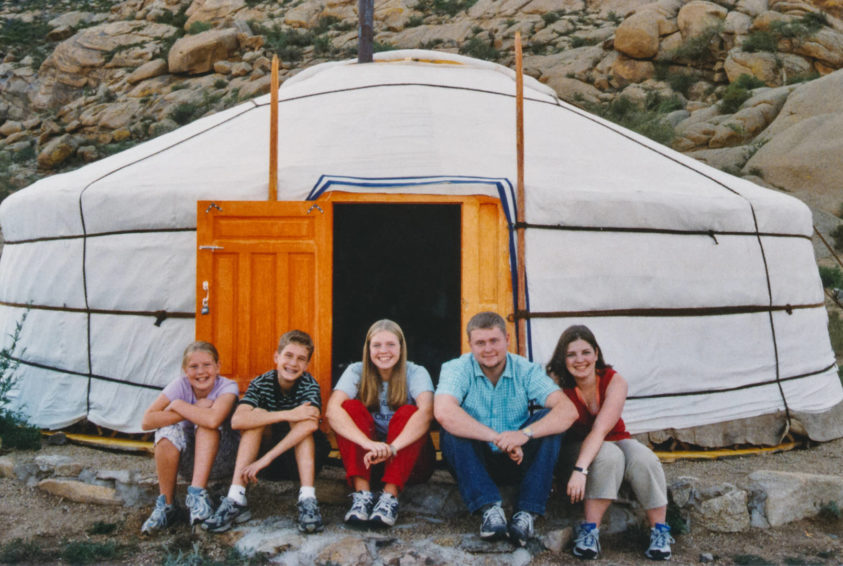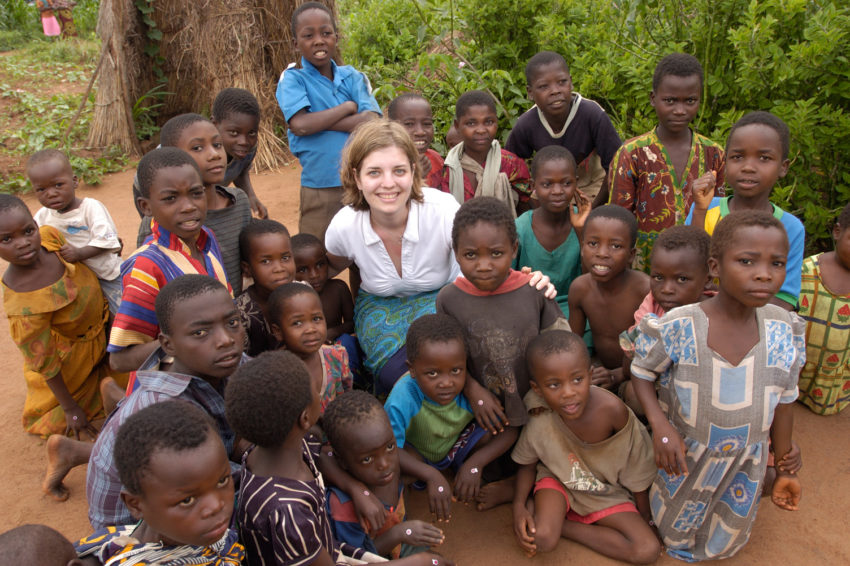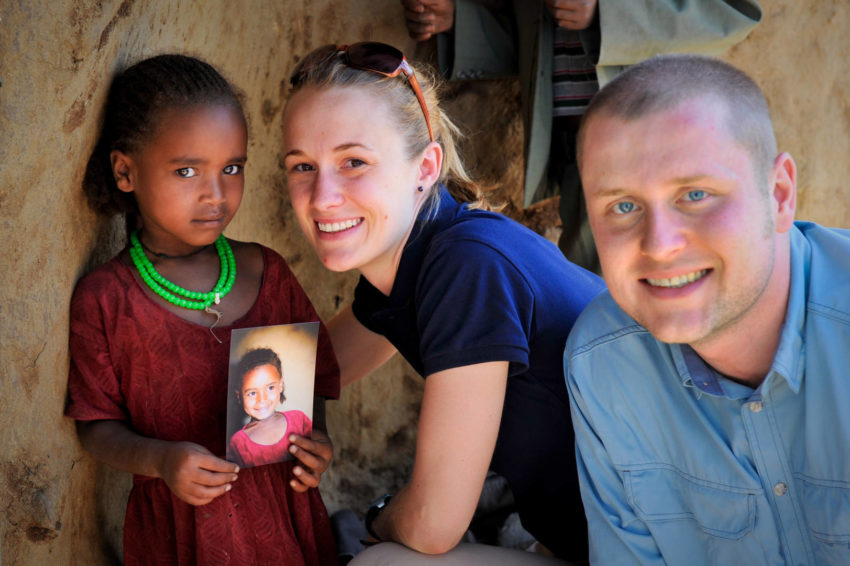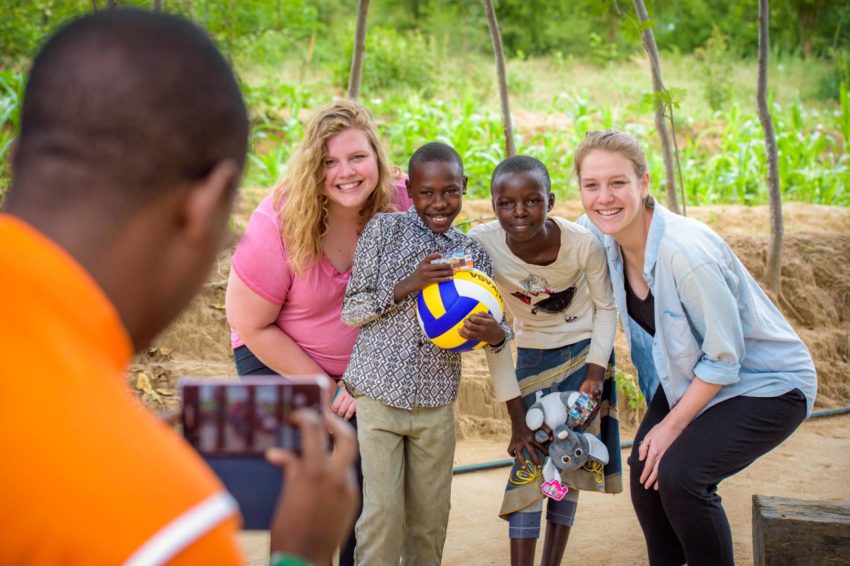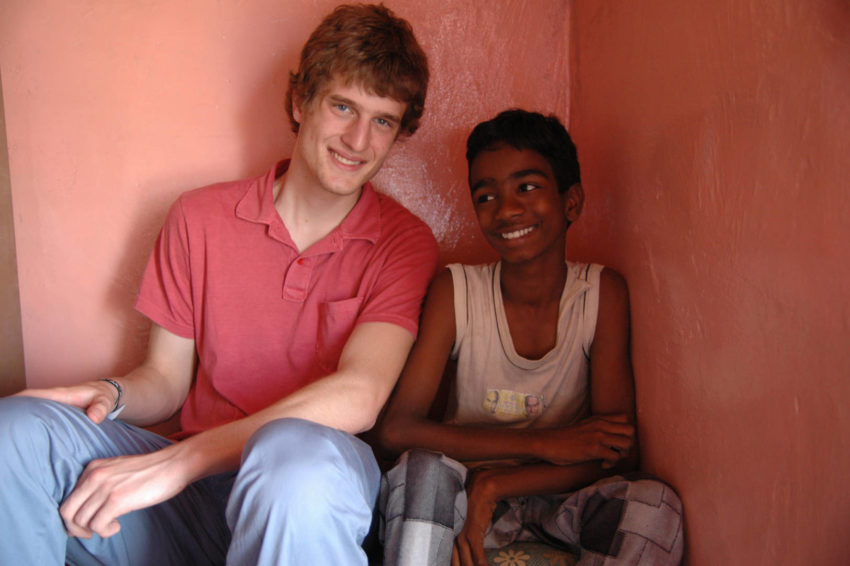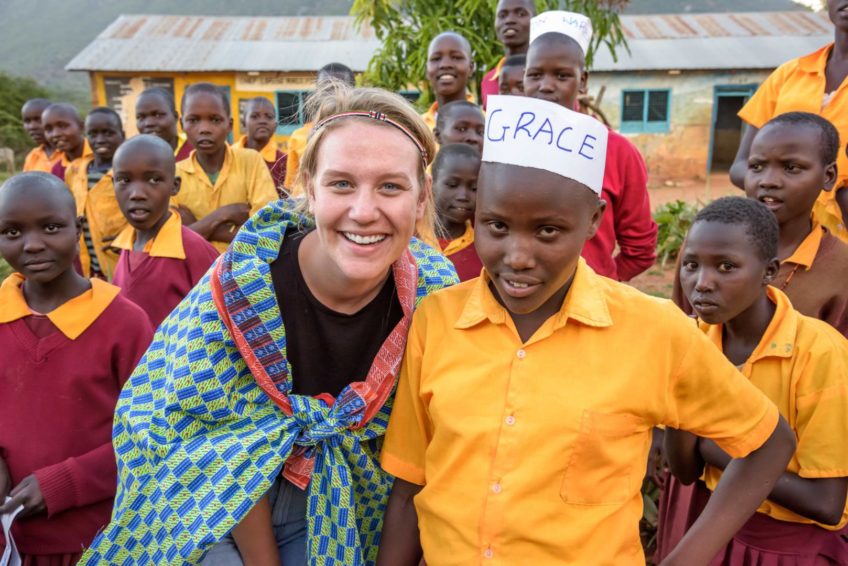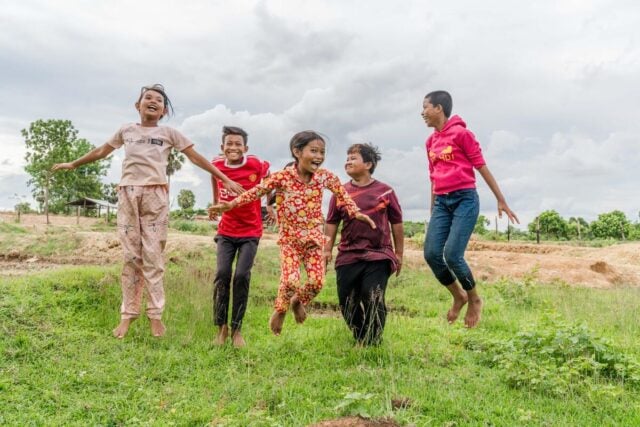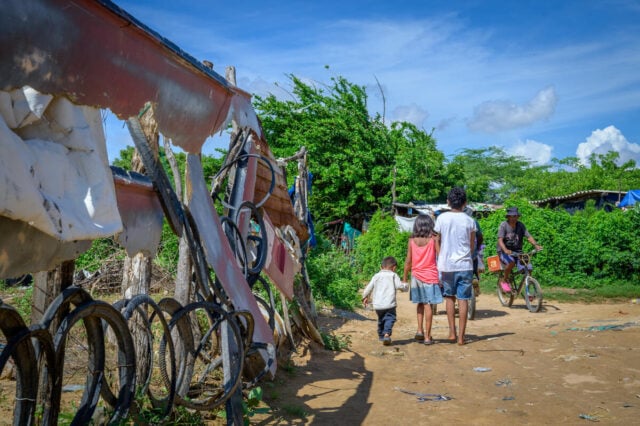When Rich and Reneé Stearns stepped out in faith in 1998 to serve at World Vision, their five children came along for the ride — literally, as they occasionally traveled the globe with their parents. The past 20 years have included eye-opening cross-cultural experiences, countless discussions about world problems around the dinner table, and constant practice in faith-fueled giving and serving.
Today, it’s easy to see Rich and Reneé in each of them. Sarah, 39, devotes herself to her children as her mom always did. Andy, 36, is an executive at Capital One, clearly having inherited Rich’s talent for business. Hannah, 33, studied law like Reneé and now stands up for vulnerable women and children as a prosecuting attorney. Thirty-year-old Pete followed his parents into ministry, and he was recently ordained as a pastor. And Grace, 26, exhibits her dad’s flair for communication as a writer and content director. In their own way, they’re each taking what they learned from their parents’ journey and incorporating it into their own careers and families.
World Vision spoke by phone with the Stearns siblings, now spread across the country leading busy lives in New York, Virginia, Illinois, and Washington state.
What were your childhood impressions of the world as a result of your parents’ association with World Vision?
Hannah: I was in elementary school prior to being involved in World Vision. As a kid, you’re not really thinking about what’s happening around the globe; you’re thinking about what’s happening down the block. So that exposure to people and ideas that were outside of my bubble were incredibly beneficial. That worldview was so different from my peers because we were talking about the refugee crisis or war at the dinner table when I was 14 or 15. We were not sheltered from what was going on in the world. We were encouraged to learn, talk about it, and really embrace it.
Pete: I remember my dad would always bring mission partners to our house for holidays or when World Vision was having a conference or special meeting. I always enjoyed those times talking with people who were from all around the world. It broadened my horizons. Looking back, I developed a deeper understanding of the world and how God is working through the lives of the poorest of the poor.
Grace: In hindsight, especially, I realize what a unique opportunity it was to have had consistent exposure to life outside of Bellevue, Washington, as a young child and adolescent. I was able to learn from a young age about the complex factors that contribute to poverty around the world, and — perhaps more importantly — what kinds of work make a lasting impact in the lives of individuals, families, and communities.
Sarah: I remember very clearly my dad saying once, “It was nothing you did that caused you to be born in a comfortable living environment, and nothing that others did that caused them to be born in an environment of poverty.” It’s always been a good reminder that we have been very fortunate as a family and that we need to be generous with those who have been less fortunate.
Andy: You can’t oversimplify what’s going on in the world. It’s very easy to say, ‘That part of the world is so screwed up, why are they corrupt, why is there a war?’ And when you really stop and think about the birth lottery and why people do the things they do based on where they grew up, you come to realize that people are all the same, and we’re all shaped by the environment we grew up in and the opportunities we had. I think my calling as a believer is to use the fact that I won the birth lottery to help others have a better life for their future for their families.
What memories stand out from your international trips?
Grace: I have so many amazing World Vision memories. I love looking back on our first trip as a family, the only trip that all seven of us went on together. We went to China and Mongolia the summer before I began sixth grade. For most of us, it was our first opportunity to see the work of World Vision first-hand, and for me, my first time leaving North America. We spent a night in a ger in Mongolia, hours out in the Gobi Desert. I will always remember watching the Perseid meteor shower with my whole family, miles from the nearest city.
Andy: On Spring Break of my junior year of high school, my first year of school out in Seattle, I went to Mexico City. I remember coming back and thinking, “Wow, that was amazing, but it felt a little sanitized.” I told my dad, “I’d like to go see the real thing. I’d like to go by myself and do some of the work for a little while.” So later that month he said, “You’re leaving for Ghana when school gets out. You’re going to spend several weeks working on a well-drilling rig. You wanted to see something more authentic, here you go.” I spent several weeks working with a bunch of Ghanaian mechanics, and they thought it was the funniest thing in the world to have some 17-year-old American kid working on the crew and digging ditches and experiencing the on‑the‑ground-with-the-people kind of work.
Sarah: I was able to travel with my parents to Zambia and Malawi in 2004. I so enjoyed the people and seeing the incredible projects they were doing.
Pete: I was in middle school when we went to Mongolia, and we got to meet some of the boys who lived in the sewers under the streets. There’s this entire group of people who climb down to live in these sewers because the city pipes are running through so it’s warmer down there. I saw these middle-school boys and I was thinking just how different their lives were than mine, how much more intense their struggles were than mine. That was a formative experience.
Hannah: Before my first Uganda trip in 2006, I was in a semester in D.C. through Cornell, and I was hit by a car. I was a pedestrian and literally got plowed over. I was in the hospital for awhile. It was a crazy thing — I was set to go to Uganda in about three weeks. We were worried we were going to have to cancel the trip, but I ended up going. And I remember sitting with my mom with my feet in the Nile, thinking, “I can’t believe I’m alive right now, first of all, and second of all, that I’m walking in Africa three weeks after being run over by a vehicle.” It was just this really healing trip, a powerful moment for us to feel God’s healing power.
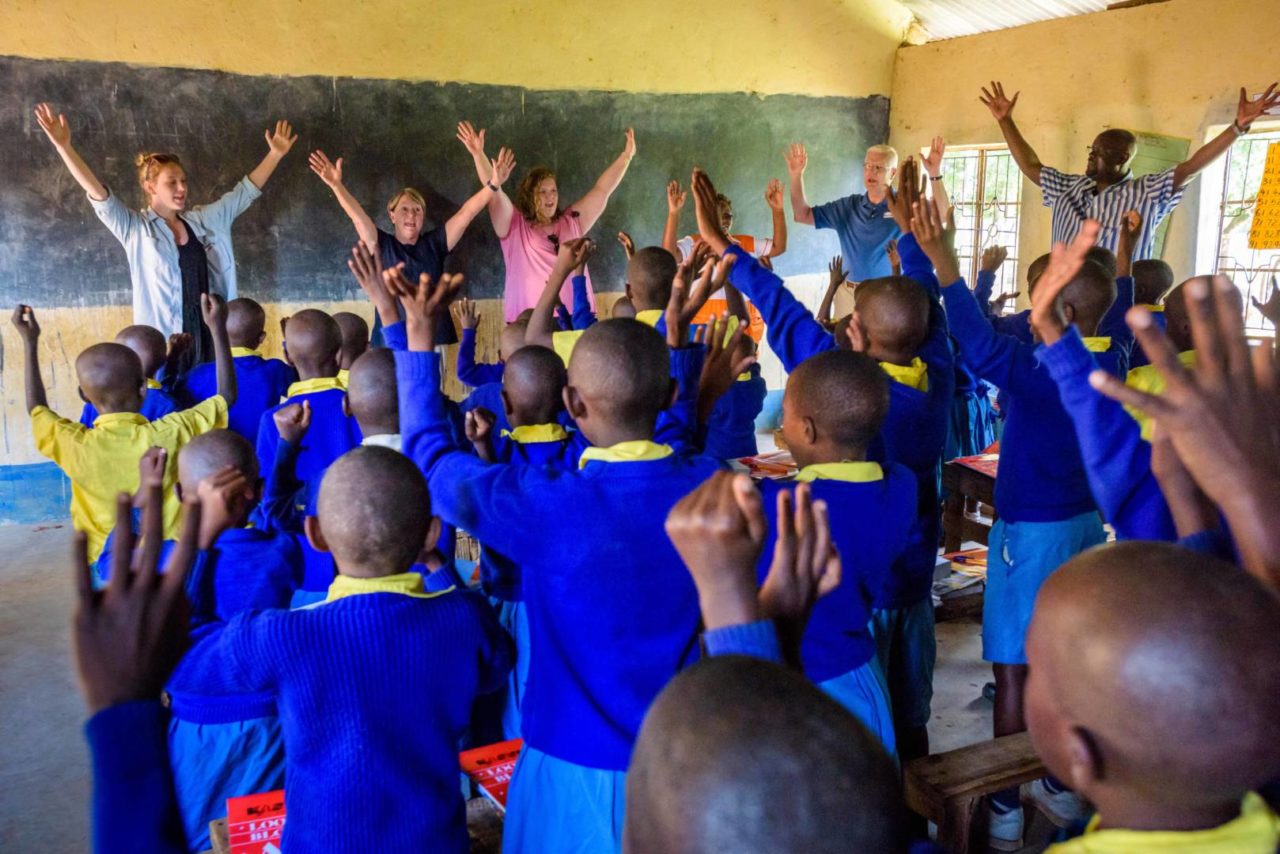
What did your parents teach you about giving and generosity?
Sarah: Each year my parents would do an activity with us as a family to choose where we would give our tithe money. They wrote the names of missionaries, churches, and organizations that we supported on index cards. Then they would give us poker chips that represented the amount of money we had to share. As a family, we chose who to support and how much support we could give to each person or organization.
Pete: Each of us would take a turn, and we would say, “I want to put 10 chips here. I want to donate to this missionary or to this mission partner.” We felt like we had ownership of the giving, even when it wasn’t our money that we were sacrificing. It allowed us to look forward to that and be excited about giving.
Hannah: Every time you get an allowance, 10% goes in tithes. It’s not optional. That was always enforced with us. You’re giving back and stewardship is really important. They are very good stewards of their money. That has always been something that I admire of them.
Grace: My mom encouraged us to tithe our allowance and taught us that it was something the Bible told us we needed to do. We had a special folio where we would designate 10% of our allowance to tithe, 10% to savings, 10% for vacation or camp spending. By the time everything was divided, there wasn’t much left for impulse buys!
Andy: When I got engaged, my dad sat us down and said, “When are you going to start tithing together?” We had some answer along the lines of, “Well, we plan to merge all of our bank accounts once we get married, and then we’ll do it.” He said, “You can’t wait that long. You’re engaged for the next year. You need to start giving together today.” That really set the tone for the next 11 years. Giving has been a huge part of our life, and we’re now teaching that to our kids.
How did you see them live out generosity and compassion?
Grace: Both of my parents were very generous with their time, and my mom volunteered regularly with several local organizations, always spending a good portion of the week doing things like tutoring students at the Ronald McDonald House or working with English-language learners. My parents made sure to teach us that, while World Vision largely focuses on global poverty, there were always ways to give back to our own community.
Andy: It was also how my parents treated others. You know, my dad was a corporate CEO for a long time, and he never looked down his nose at anybody, no matter their station. It was instilled in me and I will say “Yes sir” and “Yes ma’am” to everybody I interact with. People deserve that kind of respect and generosity of the spirit. And I saw that [generosity] throughout my life, demonstrated by my parents. Their decision that we’ll sell the house, we’ll give back the company car, we’ll give up the career to go to World Vision — at the time, that seemed like such a scary cliff to jump off. Looking back 20 years later, they personally had more opportunities and growth than they ever imagined. So it wasn’t actually “jump off a cliff and give it all away,” but really step into real life for the first time.
Pete: It was not a rare occurrence in our home to see my parents have their hearts broken for people around the world and express that emotion to us. We recognized that this wasn’t just a “pat on the back, we did a good thing” type of response. It was really modeling what empathy looks like. When they would come back from their trips, they would tell stories and we would hear that brokenness in their voices and see that empathy as they expressed it. And the emotion on their faces made it real, how important it was to value the lives of others, even if they were thousands of miles away.
Did you take any actions when you were young because of what you learned from your parents?
Pete: I found that God gave me a clear calling toward domestic mission and serving locally. So in my junior and senior years of high school, I coordinated a group of four or five friends of mine. We would go down to a soup kitchen. It was every other Tuesday night for two years, serving meals and getting to know people. I was always intentional about trying to find ways to give and to maintain that foundation of giving.
Hannah: I wrote all my college entrance essays about the AIDS crisis, which I think was maybe unusual. I also went to West Virginia my junior year of high school and worked with World Vision and their partnership with World Servants, and I got to help out in their ministry and running their camps for kids. Even through college and law school, I took missions trips to places like Mexico, building houses and developing an understanding of the need out there.
How did you experience child sponsorship when you were young?
Grace: When my dad first took the job at World Vision, each of my siblings and I got to sponsor a child that was around our same age. It felt really special to have a pen pal in Indonesia, Ekawati, who was a 7-year-old girl just like I was. It made sponsorship very personal to have a friend halfway around the globe with whom I exchanged letters every month or so. My mom would have us all gather at the kitchen counter to write letters, decorate them with stickers, and choose photos of our family to include with the letters. It really connected what my dad was doing on a big-picture scale that I probably wouldn’t have been able to understand at such a young age.
Sarah: I initially sponsored three children back in 1998 when my dad came to World Vision. I exchanged letters with them for a few years, sent packages, and even painted a portrait of one of my sponsored children for my dad. I added a few more children a couple of years later.
Hannah: I wrote letters to my sponsored child in Uganda. Later I got to meet her when I went to Uganda to work for the International Justice Mission during law school. That was a really special moment. We ended up putting her through secondary school and college as well. And now she emails me. It’s a cool thing that since I was 13 I have communicated with this girl.
Today, how do you live out values such as generosity and compassion in the context of your marriage and family?
Sarah: My family continues to sponsor five children. Regarding my own kids, we do pretty normal parent things like teaching kindness, sharing, respect for classmates, etc. They know Grandpa’s job is to help people in other places around the world.
Andy: For us, it’s been a constant push to be active in our community in charitable work. It certainly has been an important thing as we prioritize our finances. Much to our realtors’ chagrin, every time we move, we always try to spend money in a way that’s far below what we could afford so that we have the flexibility to give and inspire others through that. We’ve been blessed financially and so we try to use that money to not just give, but actually inspire others to give. Now we’re in the process of instilling that in our children. The other day [4-year-old] Lincoln said he wanted to give more to his sponsored child, and so [my wife] Kirsten and Lincoln called World Vision and said they wanted to make a cash donation to the child, and Kirsten actually put Lincoln on the phone to tell the operator what he wanted to do.
Hannah: I sponsor six kids with my husband, and we’re hoping to sponsor a couple more here soon. We continue to be really involved as much as we can, encouraging our church to get involved, attending events that support World Vision, and continuing to financially support World Vision. World Vision has remained a huge part of my life. There’s no other nonprofit that I think does as good of a job. Every time we’re talking about how we want to support a cause, we go to World Vision first and say, “Is World Vision already doing work in this area?” I just got married in February, and instead of doing wedding favors, we did a donation to World Vision and also to a community nonprofit here in Spokane, a donation in everyone’s name, instead of a favor.
Pete: We’re intentionally investing in our church’s in our children’s programs and elementary and middle school programs, recognizing that when that next generation is in tune with the challenges facing the world, they’re going to create a church that is more focused on what God’s kingdom really looks like for the future. And that’s the church that’s going to be formative in my 1-year-old son’s life. Also, the most valuable resource in teaching your child about empathy, compassion, and generosity is you. You will not find a great devotional study that will change your child’s life and worldview if you’re not modeling that yourself. It’s being vulnerable with your own faith journey, inviting them to be a part of things that we may keep quiet, being intentional about modeling active faith for them, and teaching them what Scripture has to say about the people around the world.
What do you see as your parents’ legacy in your life?
Andy: I was with American Express for about a dozen years and took a year off to work with a microfinance nonprofit. The decision to go work in the nonprofit world was a willingness to be risky for God. That opportunity didn’t pan out for me; it was not the right fit, and job-wise it wasn’t a place where I was having a ton of impact, and so we decided to go back to corporate America. But the modeling that my dad demonstrated around being willing to take the risk certainly empowered me to say, “Hey, I can quit my job and take a big pay cut and go try something out for a little while and hopefully make a difference.”
Pete: My parents’ investment in World Vision has been a huge influencer for me to seek a ministry vocation. My entire professional career has been ministry-oriented, serving with students and families in the church setting. But it can be difficult to pursue a field where you know that long-term, this isn’t necessarily going to be the best financially for my family. There was a certain level of comfort in having seen my parents invest deeply in ministry, to live into God’s calling in their lives. That gave me the freedom to say, “I’ve seen what God does when people sacrifice their plans to allow his plan to fill them. And I’ve seen God’s faithfulness in providing for our family.” I think what holds a lot of people back from living sacrificially is this false excuse that “I can’t because my primary responsibility is to support my family.” The truth of the matter is, for me as a kid, the financial sacrifice was unnoticed. But my parents’ faithfulness was incredibly evident to us. If you ask any of my five siblings, we would all say that we would far prefer the lives we have versus what we would have had if my dad continued in the Fortune 500 world.
Hannah: My parents’ legacy is as much a legacy for myself and my siblings as it is for anyone else. They’re incredible role models, and I wouldn’t be who I am without them. They’re people who have never wavered; they never questioned God’s goodness or God’s faithfulness or God’s generosity to our family. And every step of the way they followed God’s call on their lives. That’s very inspiring to me, to follow in the footsteps of my parents and try to be really open to those things. That legacy is us. They really shaped us and showed us the way.
Heather Klinger of World Vision’s staff in the U.S. contributed to this article.
